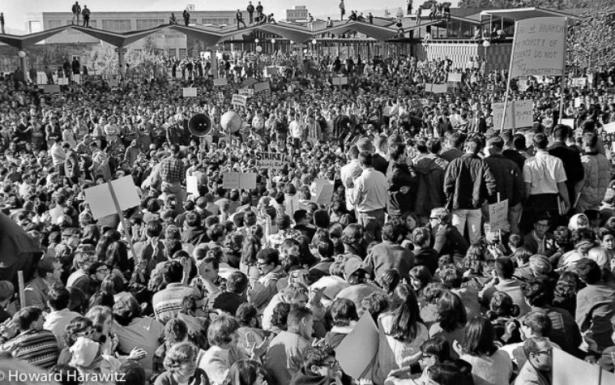After reading of actions at UC Berkeley to prevent a speaker from addressing a meeting, and disrupting a dean’s backyard party, as a veteran of the Free Speech Movement, the first thing that comes to my mind is "What was the goal of the protest?" "What were the actions meant to accomplish?"
Demonstrations can be organized to accomplish different goals. A group can call attention to an issue by making it visible. A demonstration can be held to show widespread support for an issue, and by doing so putting pressure on decision makers. A demonstration can be a platform to persuade those not committed, and to encourage those who are.
A demonstration can also seek to force a change in policy through disruption. This can range from a brief pray-in to an organized walk-out or silent standing protest during an event. It can also peacefully but forcefully prevent the machinery from functioning by putting our bodies on the wheels and gears.
These and many other tactics (public fasts, occupations, mobile traffic blockages, sound disruption) are generally based on the assumption that your ultimate goal can best be reached by persuading the largest number possible that your cause is right, and to support it. A strike is a prime example. It is a peaceful, but forceful disruption. It requires mass participation and active support.
But this approach is based on the notion that the mass can be persuaded, and it is its persuasion that is your guiding principle - don't do stupid stuff that will make it harder to achieve your goal. Like breaking windows, using language certain to alienate some people you want to reach, etc.
But there is another approach, which I think of as the politics of frustration, where you conclude that the seriousness and urgency of your cause means anyone not already persuaded is irredeemably stupid, evil, or otherwise unreachable and THERE'S A CRISIS RIGHT NOW WE DON'T HAVE TIME TO ARGUE!!!! You conclude you must force acceptance of your idea, and do so by the forcefulness of your rhetoric and action. Instead of refuting your opponent's arguments and logic, you attempt to prevent those arguments from being heard.
We've seen this too, an armed invader in the Chancellor's house, an attempt to burn that house with the Chancellor and family inside. Disruption of speakers, attempts to prevent speakers from presenting by breaking windows, lighting fires, etc. The ultimate expression was the Weather Underground. While the peace moment made a widespread and very successful effort to reach active duty GIs, the Weather Underground planned a nail bomb for an NCO Club dance at Fort Dix.
The urgency of the situation in Gaza is impossible to overstate, and the motivation of the students is beyond reproach, and very understandable. Six months of genocide in which the US government is fully responsible, apparently impervious to public opinion, is very frustrating and enraging. If the atmosphere at Cal is like it was 10 years ago, most students/faculty/staff are fully aware (see it in their media) and are either unconcerned, back Israel, or simply have no interests beyond their studies and their social media. I may be wrong here. During the Third World Strike, the assessment of its leadership was that unlike the FSM or the Vietnam war, the majority on campus could NOT be persuaded to support their cause, and sought to win by use of force (also banking on police overreaction to that, a well-founded estimate), disruption not meant to persuade but to impose. To a large extent it worked, because the administration and police acted as expected, with indiscriminate violence, but I fear taught subsequent movements some bad lessons.
Clearly the demonstration at the Dean's house was not meant to persuade students or faculty of the righteousness of the Palestinian cause. Its aim was to be disruptive. Had it taken place at, for example, a Commencement Day or other major school event, it could be appropriate, to point to UC involvement in weapons programs or AI collaboration with Israel, if such exists, or to point to UC investments in Israel. That would be appropriate. But at the backyard party for grads? No one would be persuaded by this. Some would be offended. And neither the law school dean nor his grads have any control over UC's investment policies. Wrong target, counterproductive tactic. Similarly plastering campus with a blatantly anti-Semitic poster accusing the dean, who has consistently spoken out for the rights of campus anti-Zionists, and should be seen as an ally, is a self-destructive tactic. Will it persuade anyone? Will it do anything but suggest that opposition to Israeli crimes in fact IS based on anti-Semitism? Why do it?
When the Graduate Coordinating Committee (GCC) and Free Speech Movement (FSM) organized a strike that shut down the campus the morning we were being arrested in Sproul Hall, under Wheeler Oak signs were being made for the picket lines. One student made one that said, “Adolf Hitler, 1933, Clark Kerr, 1964.” My grandmother, a refugee from Hitler, went up to Steve Weissman of the GCC and said, “That is wrong, tell him to take that down.” Steve looked at the sign, said, “You’re right,” and told the man to take down the sign. Truth is our strength. Use it.
Again, for god's sake people, LEARN TO FIGHT SMART!!


Spread the word